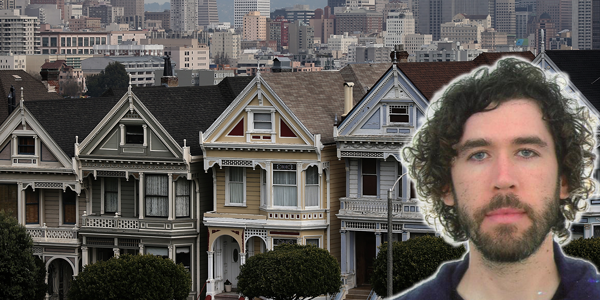Trending
California YIMBY’s Brian Hanlon on what real estate insiders can do to fight NIMBYism
In an industry known for risk, many developers are politically risk-averse

He may have received the blessing — and the big bucks — of Silicon Valley’s biggest power players, but Brian Hanlon has one more demographic to charm: developers
Hanlon is leading California YIMBY, a nonprofit lobbying organization that aims to push pro-housing, pro-development policies through the state legislature. So far, he’s raised $500,000 from tech bigwigs like Microsoft executive Nat Friedman and Pantheon CEO Zack Rosen.
But developers have remained tepid, despite many sharing his organization’s goal of making housing easier and cheaper to build, he told The Real Deal.
“Developers complain all the time about how the California land use system is broken,” said Hanlon, who lives in Oakland and began his political career protesting evictions in San Francisco’s Mission district. “They’ll raise money to fight a bill that harms a certain development, but they haven’t organized for a positive, future-oriented agenda.”
He argues that California YIMBY could be their chance.
Hanlon hopped on the phone with TRD Thursday morning to chat about his organization, the misinterpretation of neoliberalism, and how real estate insiders could do better.
How will California YIMBY work?
California YIMBY is not going to have municipal chapters, but there already are YIMBY organizations all throughout the state and we’re going to work with them to grow membership and coordinate. We’re all part of the YIMBY movement, even though we may be independent organizations. In L.A., the main group we’ll be working with is Abundant Housing L.A.
How were you able to find investors in the tech industry, and how did you meet Nat and Zack?
A lot of YIMBY volunteers work in tech, so I had this community already. I met Zack Rosen through Twitter last year — he reached out to me and wanted to get coffee. Through him, I met Nat.
Why are techies drawn to YIMBYism?
I think tech people are used to solving to hard problems. They’re used to thinking in terms of scale: ‘How do we solve a hard problem and how do we do so for many many people?’ Inclusionary housing may be the prevailing policy, and they feel that it’s not enough. Tech folks have optimism for what housing can do.
Is that thinking naive?
It’s possible that there’s some naïveté. But many of the people I talk to understand the issues. They think that just because the problems have not been solved doesn’t mean they can’t be solved.
What’s your take on inclusionary housing?
The vast majority of low-income folks live in market-rate housing. If we have a type of policy under which only low- and middle-income people win the housing lottery, young people moving into the city aren’t taken care of. If our policies only focus on incumbents and some lucky winners, that’s the wrong approach.
What do you make of tenant protection policies?
I do support tenant protection laws. I support increased funding for below-market-rate housing. I support a lot more funding for the tax credit program and expanding the Section 8 program. I think it’s the government’s role to take care of people who can’t afford market-rate housing. There are a number of ways to do it, but I just don’t think inclusionary rules are the way to go.
Why do you think inclusionary rules are often favored?
From the perspective of local and state governments, it’s free money. They don’t need to spend tax money on housing if they can require developers to build a certain number of affordable units. It’s also easy for constituencies to be anti-capitalist. Developers are an easy target that people go after.
Why shouldn’t the burden fall on developers?
It’s misguided. Whatever you think of individual developers — I’m sure plenty of them are jerks, but that’s neither here nor there — they’re providing an essential thing: housing. But if we only depend on them for affordable housing, we’re depending on a purely private mechanism. That’s peak neoliberalism. And it’s entirely contingent upon business cycles, even though people need affordable housing all the time. At the end of the day, it’s a way for local government to pretend to be progressive without spending public tax dollars.
Have you worked with developers or at least solicited money from them?
Virtually all of the money that we’ve raised has come from the tech industry. I am certainly willing to accept money from developers, it’s just that I’ve gotten a much better reception from tech leaders than from real estate people.
Why is that the case?
I think a lot of developers have been operating in this anti-development political climate for decades, and they’re very averse to upsetting the people who control it. Tech people have lower stakes. It’s funny, in an industry known for risk, many developers are politically risk-averse. They complain about the system, but they haven’t done much about it.
What’s an example of an alternate way to provide affordable housing?
It all comes down to raising public revenue through other means. For instance, we can get rid of Prop 13. Prop 13 is a ballot initiative that passed in 1978 that limits the assessed tax rate of a property to 2 percent a year. So if you bought your property in 1976, your base tax rate now is still the 1976 rate plus 2 percent.
When it comes to housing construction, can you compare L.A. and San Francisco?
Everything in San Francisco is completely discretionary, and in L.A. a lot of projects require General Plan amendments, so in that regard, they are similar. Building is very hard in both places, and neither has a lot going on. It’s a lot more expensive in San Francisco but L.A. has lower average wages, so even though rents are higher in S.F., the rent burden is higher in L.A.
Do you think anti-gentrification activists can be misguided?
I would make a distinction between gentrification and displacement. I think the government should focus on displacement, and there are a number of ways to do it. One is for governments to permit developers to build sufficient housing, and another is tenant protections like rent-control laws and funding legal services like attorneys to help people in need. Gentrification just means that neighborhoods change, they become wealthier over time. Long-term residents may not like that, even though it could happen in neighborhoods without displacement, residential or commercial.
Have you heard about the Boyle Heights protesters that have been targeting one particular coffee shop?
I strongly encourage the folks who protest in Boyle Heights to also protest in wealthy neighborhoods, like the Westside. What’s really driving gentrification is that wealthy neighborhoods have been on development lockdown for decades.
You mentioned neoliberalism earlier. Can you explain how anti-development sentiments contradict the progressive idea that everyone should be able to afford housing?
There are many different kinds of people that protest housing, and many claim to be liberal radicals that oppose capitalism. A lot of these people majored in geography or read David Harvey pamphlets and have a very wrong understanding about housing markets. I really don’t think a lot of these folks understand that when they want developers to be the ones to provide housing, they’re actually advocating for neoliberal policies. What they’re supporting is a corporate-run welfare state.
Finally, if you could address developers, what would be your message?
Be ambitious. The problems that make it harder for you to build homes also make it harder for low and middle-income people to stay in their homes. There’s an opportunity for a real alliance. You should not accept the current status quo.




